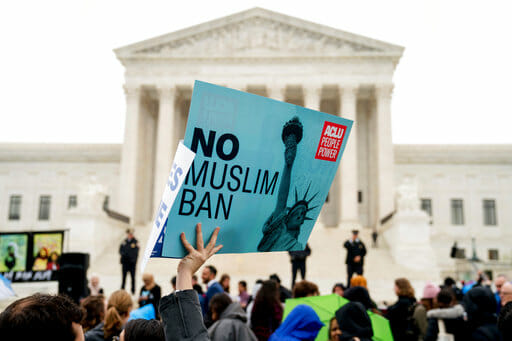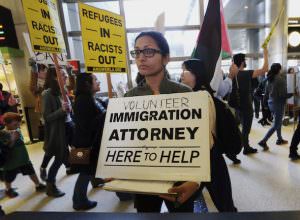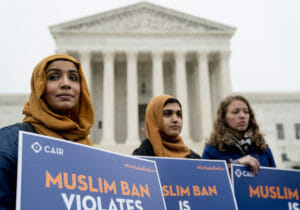The Supreme Court, the Muslim Ban and Trump’s Ugly Abyss of Racism
The highest court in the U.S. delivers a tsunami of decisions, most of which leave no doubt about its fiercely right-wing orientation. Andrew Harnik / AP
Andrew Harnik / AP
The U.S. Supreme Court delivered a tsunami of decisions this week, most of which left no doubt about its fiercely right-wing orientation. By a narrow 5-4 majority, the court upheld Republican gerrymandering in Texas, overturned pro-choice legislation in California, dealt a significant blow to public sector unions and upheld President Donald Trump’s latest Muslim ban. Each decision sets back decades of organizing and progressive legislative achievements, struggles for which people fought, protested, went to jail and, in some cases, died. Each decision will be heralded as a signal achievement of Senate Majority Leader Mitch McConnell, who engineered the current makeup of the court by denying President Barack Obama a confirmation hearing for his nomination to replace the late Justice Antonin Scalia. But of all these decisions, the most odious, the most reprehensible, was the case of Trump v. Hawaii, upholding the Muslim ban, endorsing and empowering Donald Trump’s vile, naked racism.
This case involves the three successive attempts by Donald Trump to deliver one of his many notorious campaign promises, to implement, as he said at one rally, “a total and complete shutdown of Muslims entering the United States.” Trump issued the first Muslim ban on Jan. 27, 2017, provoking massive protests at airports from coast to coast. After legal challenges blocked that ban, Trump issued “Muslim Ban 2.0” in March. That one was also blocked by the courts, with one federal appeals court concluding Trump’s executive order “drips with religious intolerance, animus and discrimination.” Finally, in September, the White House issued a proclamation, “Muslim Ban 3.0,” with narrowly tailored legal language restricting, to varying degrees, entry to the United States for people from Chad, Iran, Iraq, Libya, North Korea, Syria and Venezuela. The Supreme Court allowed it to go into effect while the legal challenges progressed. This week, it gave Trump the green light to make his racist ban permanent.
Justice Sonia Sotomayor wrote a blistering dissent that performed a vital public service, by collecting all of Donald Trump’s blatant anti-Muslim and Islamophobic statements, tweets and press releases in one place, permanently inscribed in the public record for future generations to behold. In addition to the formal campaign statement that he wanted to ban all Muslims, Sotomayor summarized, “Trump told an apocryphal story about United States General John J. Pershing killing a large group of Muslim insurgents in the Philippines with bullets dipped in pigs’ blood in the early 1900’s.” He later said—again, from Sotomayor’s dissent—“[w]e’re having problems with the Muslims, and we’re having problems with Muslims coming into the country.” The list of blatant statements is long and, as she wrote, “harrowing.” Of Muslim Ban 3.0, she concludes, “this repackaging does little to cleanse … the appearance of discrimination that the president’s words have created.”
Trump’s Muslim Ban is now the law of the land. Sotomayor’s dissent continued: “Trump justified his proposal during a television interview by noting that President Franklin D. Roosevelt ‘did the same thing’ with respect to the internment of Japanese Americans during World War II.”
She was referencing the 1944 case, Korematsu v. United States. Fred Korematsu was a California-born U.S. citizen of Japanese heritage, who was ordered to report to one of the internment camps where 110,000 Japanese Americans were imprisoned after Pearl Harbor. He resisted the order, and took the government to court. The Supreme Court upheld the legality of the internment camps by a 6-3 majority. Justice Frank Murphy, in his dissent, said the policy “falls into the ugly abyss of racism.”
In 1983, research revealed that the government suppressed evidence that Japanese Americans posed no threat during WWII, and Korematsu’s conviction for avoiding internment was vacated. But the legal precedent set by the Supreme Court remained on the books — until this week. As if anticipating how reviled their decision would be held, the majority specifically stated that the Korematsu decision was in no way relevant to the matter before them, but, nevertheless, they formally overturned the Korematsu decision. Fred Korematsu died in 2005, but his daughter, Karen, responded in a statement: “The Muslim travel ban is unjust and singles out individuals due to the religion they practice, similar to Executive Order 9066 that unconstitutionally imprisoned my father due to his Japanese ancestry. Although the Court overruled my father’s case today, it only substituted one injustice for another.”
Despite the wave of negative decisions, there are signs of hope. “We are not waiting. We are resisting,” Linda Sarsour, director of MPower Change, the first Muslim online organizing platform, and co-chair of the Women’s March, said on the Democracy Now! news hour. “I will be joining hundreds of women engaging in the largest mass civil disobedience by women that this country has ever seen.” While the Supreme Court adjourns for the summer, networks of grassroots social justice organizations are just getting started.
Your support matters…Independent journalism is under threat and overshadowed by heavily funded mainstream media.
You can help level the playing field. Become a member.
Your tax-deductible contribution keeps us digging beneath the headlines to give you thought-provoking, investigative reporting and analysis that unearths what's really happening- without compromise.
Give today to support our courageous, independent journalists.




You need to be a supporter to comment.
There are currently no responses to this article.
Be the first to respond.